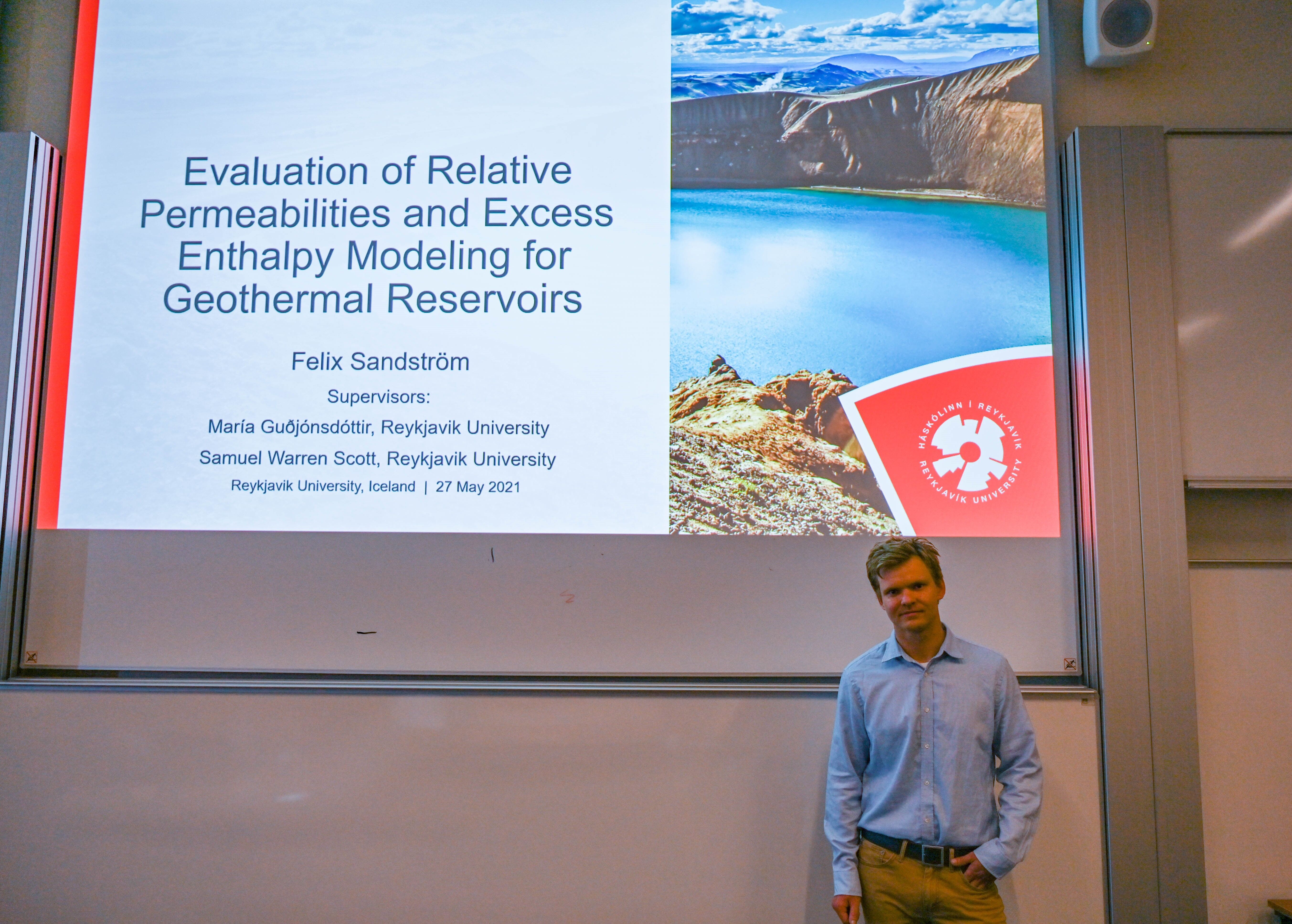MSc Thesis: Evaluation of Relative Permeabilities and Excess Enthalpy Modelling for Geothermal Reservoirs
REYKJAVIK, May 27 - MSc in Sustainable Energy Engineering candidate, Felix Sandström, successfully defended his master's thesis where he performed an Evaluation of Relative Permeabilities and Excess Enthalpy Modeling for Geothermal Reservoirs. Felix's work was supervised by Dr. María Guðjónsdóttir from Reykjavik University and Dr. Samuel Warren Scott from Reykjavik University.
 Felix began with the an explanation that most geothermal systems in Iceland and worldwide used for power generation can be classified as liquid-dominated geothermal systems, meaning that the pressure-controlling phase is liquid. Boiling results as heated fluid ascends and the pressure decreases to saturation pressure. In most geothermal wells drilled into these systems, the enthalpy of the fluid produced from wells is approximately equal to the enthalpy of saturated liquid at the reservoir condition.
Felix began with the an explanation that most geothermal systems in Iceland and worldwide used for power generation can be classified as liquid-dominated geothermal systems, meaning that the pressure-controlling phase is liquid. Boiling results as heated fluid ascends and the pressure decreases to saturation pressure. In most geothermal wells drilled into these systems, the enthalpy of the fluid produced from wells is approximately equal to the enthalpy of saturated liquid at the reservoir condition.
Felix pointed out, that in many of the wells, the measured discharge enthalpy is much higher than the enthalpy of single-phase liquid and can even approach the enthalpy of single-phase vapor. The higher specific enthalpy of such ‘excess-enthalpy’ wells results from phase segregation and, to a lesser extent, additional boiling in the fractures caused by conductive heat transfer. A better understanding of the phase segregation process is essential to improving the accuracy and utility of geothermal reservoir models and making more realistic estimates of the power generation potential of high-enthalpy geothermal resources.
He moves on to state that relative permeability is a measure that quantifies interactions between the flowing phases and the rock and strongly influences phase segregation behavior. They can be expressed as functions of the static liquid saturation and are used in reservoir models to simulate multiphase flow. Based on well data from two geothermal fields in Iceland, Nesjavellir and Hellisheidi, Felix calculated relative permeabilities and estimated curves for several wells using the Shinohara method (Shinohara, 1978).
By using models of fluid flow towards a producing wellbore, Felix was able to to see how these curves affected the discharge enthalpy. He created and tested two types of radial models: 1) a single porosity (SP) model and 2) a multiple interacting continua (MINC) model. The SP models, which has uniform permeability and porosity, could not generate discharge enthalpies above 2000 kJ/kg. The MINC models, however, involving both matrix and fracture flow, were able to generate discharge enthalpies near that of single phase vapor (2800 kJ/kg).
Next, Felix performed a comprehensive sensitivity analysis with the MINC model to investigate the sensitivity of flow behavior to various model parameters (e.g., relative permeability, porosity, fracture spacing, etc.). The results show that many parameters contribute to excess enthalpy. The static liquid saturation, permeability, fracture spacing, and relative permeability are of most importance, and porosity and the ratio of fracture fluid volume relative to matrix volume are of secondary importance.
With the results from the 20-year simulations, Felix showed that flowing enthalpy can vary by 350 kJ / kg when comparing the different curves and different residual saturations. Based on this, he proposed that it may be concluded that the phase segregation and the type of relative permeability curve selected are of great importance in reservoir modeling and can have substantial affect on decisions concerning geothermal field development.
Congratulations Felix for an excellent thesis defense!
